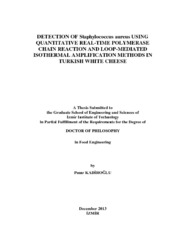Please use this identifier to cite or link to this item:
https://hdl.handle.net/11147/2968Full metadata record
| DC Field | Value | Language |
|---|---|---|
| dc.contributor.advisor | Korel, Figen | en |
| dc.contributor.author | Kadiroğlu, Pınar | - |
| dc.date.accessioned | 2014-07-22T13:48:40Z | - |
| dc.date.available | 2014-07-22T13:48:40Z | - |
| dc.date.issued | 2013-12 | en |
| dc.identifier.uri | http://hdl.handle.net/11147/2968 | - |
| dc.description | Thesis (Doctoral)--Izmir Institute of Technology, Food Engineering, Izmir, 2013 | en |
| dc.description | Includes bibliographical references (leaves: 71-84) | en |
| dc.description | Text in English; Abstract: Turkish an English | en |
| dc.description | xii, 86 leaves | en |
| dc.description | Full text release delayed at author's request until 2017.01.14 | en |
| dc.description.abstract | The aim of this study was to utilize the quantitative real-time polymerase chain reaction (qPCR) method for direct quantitative detection of S. aureus in Turkish white cheese samples and identification of the isolated colonies using phenotypic and molecular methods. The TaqMan and LNA probe-based qPCR analyses were compared by targeting the nuc gene of S. aureus cells to improve the performance of qPCR analyses to quantify low levels of S. aureus cells. TaqMan probe-based assay was found to be more sensitive than LNA probe based assay in S. aureus pure culture and artificially contaminated white cheese sample studies. For direct bacterial DNA extraction from cheese samples, four different methods were compared. The detection range of S. aureus quantification was improved down to 13.2 CFU/g with the combined DNA extraction method of using trypsin and the food DNA extraction kit in artificially contaminated cheese samples. In the naturally contaminated cheese samples, the bacterial numbers calculated by the qPCR method were higher than the plate counts which can be related to detection of live and dead cells together. Loop-mediated isothermal amplification (LAMP) method was found to have some weak points in giving consistent results with lower efficiency value for detection of S. aureus. In the identification part of the study, 207 pure cultures were obtained. Among the 24 phenotypically and genotypically characterized isolates, 3 isolates were found to be S. aureus according to the sequence analyses of the 16S ribosomal DNA genomic region. | en |
| dc.language.iso | en | en_US |
| dc.publisher | Izmir Institute of Technology | en |
| dc.rights | info:eu-repo/semantics/openAccess | en_US |
| dc.subject.lcsh | Staphylococcus aureus | en |
| dc.subject.lcsh | Cheese--Microbiology | en |
| dc.title | Detection of staphylococcus aureus using quqntitative real-time polymerase chain reaction and loop-mediated isothermal amplification methods in Turkish white cheese | en_US |
| dc.type | Doctoral Thesis | en_US |
| dc.institutionauthor | Kadiroğlu, Pınar | - |
| dc.department | Thesis (Doctoral)--İzmir Institute of Technology, Food Engineering | en_US |
| dc.relation.publicationcategory | Tez | en_US |
| item.languageiso639-1 | en | - |
| item.fulltext | With Fulltext | - |
| item.openairecristype | http://purl.org/coar/resource_type/c_18cf | - |
| item.openairetype | Doctoral Thesis | - |
| item.grantfulltext | open | - |
| item.cerifentitytype | Publications | - |
| Appears in Collections: | Phd Degree / Doktora | |
Files in This Item:
| File | Description | Size | Format | |
|---|---|---|---|---|
| pinar_kadiroglu_tez.pdf | DoctoralThesis | 2.38 MB | Adobe PDF |  View/Open |
CORE Recommender
Page view(s)
122
checked on Jul 22, 2024
Download(s)
120
checked on Jul 22, 2024
Google ScholarTM
Check
Items in GCRIS Repository are protected by copyright, with all rights reserved, unless otherwise indicated.